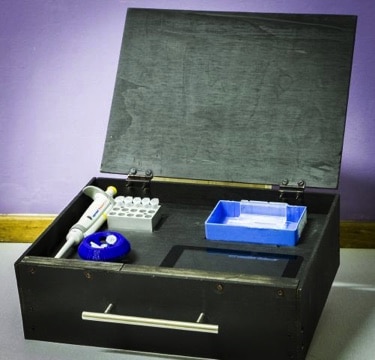Two Master’s students from South Africa have invented ground-breaking medical tech to diagnose diseases in Africa’s remote regions.
In response to the 2014 Ebola epidemic, Faul and Lotter designed a ‘lab-in-a-box’ that “will be built in Africa for Africa.”
The FieldLab is a solar-powered, 3D-printed briefcase of medical equipment designed to be used in harsh and hard-to-reach environments, which most mobile laboratories cannot reach.
During the Ebola pandemic, much of Africa was left defenseless due to limits in medical technology. A lack of portable equipment to diagnose those in remote regions meant the disease could spread unchecked.
In response to this, research laboratories have been developing equipment to deal with future pandemics. But the two students from South Africa have potentially created the most sophisticated design to date.
The FieldLab includes a microscope that can diagnose malaria, a centrifuge, PCR thermocycler and a visualization system. Power is generated through solar panels.
Each case costs less than $1,500, making it ideal for poorer African countries and aid organizations. Its rugged design means it could even be carried through conflict zones.
Faul told Rhodes University, “We started working on the prototype this year; it is amazing how much attention it has already received. We are very excited that so many people share our vision for better medical diagnostics and scientific equipment designed for Africa.”
FieldLab’s success was made possible by the rise of 3D-printing technology. Because it uses non-expensive equipment, it makes market testing and small production runs possible for new designers and entrepreneurs. Two young Master’s students will save many African lives as a result.
The future of medicine may increasingly be shaped by small start-up projects designed through 3D printing.
The FieldLab is set for launch in 2018.
Read about how 42% of the world’s falsified and substandard drugs are found In Africa.













